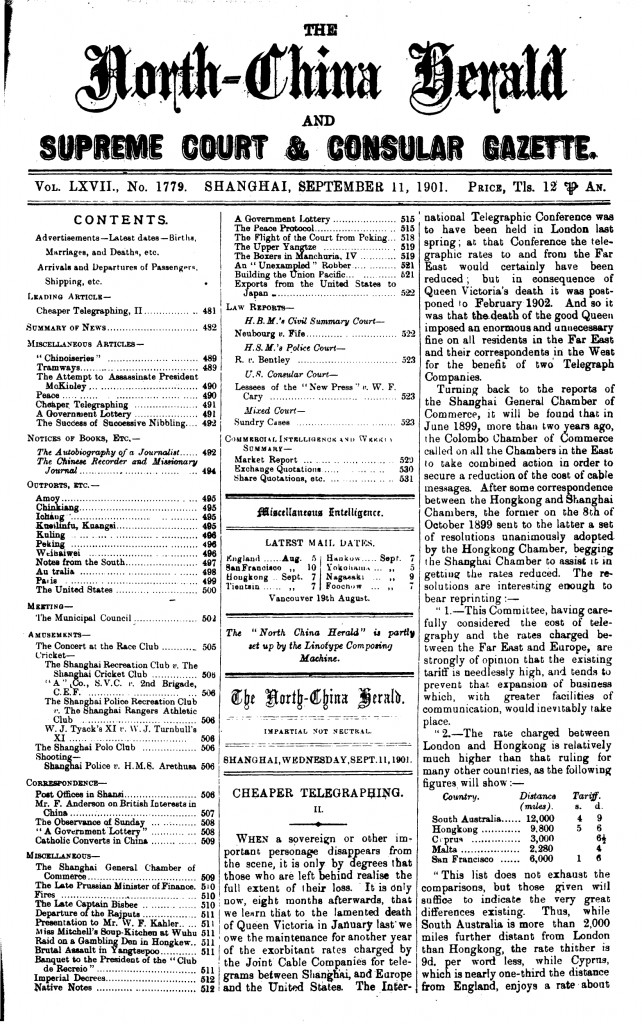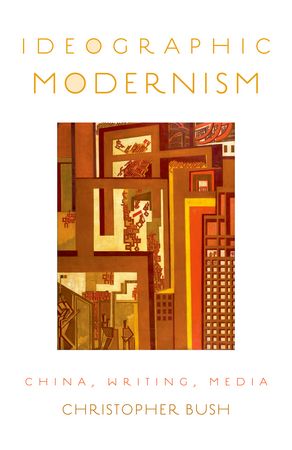Posted: September 15th, 2012 | 1 Comment »
A very quirky article in the British press regarding a series of nineteenth century French postcards produced between 1899 and 1910 in which French artists were asked to envisage the year 2000 in Paris. You can see many of the cards here. Some are a bit bonkers – underwater croquet, tame whales, firemen with wings instead of ladders to get to high buildings…but others are rather prescient – headphones, computer labs for teaching etc. One may be of rather more interest to China Rhyming regulars as it features a design for a fast electric train, possibly indicating that the train could go all the way to China – and indeed a Chinese man is shown about to board presumably to go all the way home. We’re still a good way from the much talked about Iron Silk Road from China to Europe but the idea has clearly been around a long time!

Posted: September 14th, 2012 | No Comments »
There’s currently a long and rather boring spat going on in China around who owns and doesn’t own and did own and will own the Wang Lo Kat herbal tea drinks brands – known as Wang Lao Ji on the mainland – the whole mess is laid out here in an article. Wang Lo Kat has been around since 1828 when it originated in Canton invented by a certain Dr Wong Chat Bong. It’s tasty and the red cans and green boxed tea packaging is cool too. As they’re in the new time then for this 1960s advert for the brand:



Posted: September 12th, 2012 | 2 Comments »
Sorry, should have posted this yesterday but forgot! The front page of the North China Herald for September 11th 1901…the headline article being the 1901 equivalent of “cheaper roaming charges for all!!”

Posted: September 11th, 2012 | No Comments »
The Siege of Tsingtao was the attack on the German-controlled port of Tsingtao (now Qingdao) in China during World War I by Japan and Britain between October and November 1914 against Germany. It was the first encounter between Japanese and German forces, and also the first Anglo-Japanese operation during the war.
More details on the Siege here
This map was published in October 1914 in the North China Herald and details the lay of the land and the forces involved in quite some detail.
PS: more images form the Siege of Tsingtao on my Tumblr overspill site – http://chinarhyming.tumblr.com/

Posted: September 10th, 2012 | No Comments »
Like me you probably best know the British photographer Cecil Beaton for his gorgeous portraits of various lords, ladies, assorted nobs, debs and Bright Young Things from before the war. Beaton was massively popular as he knew how to weild the airbrush and make everything and everyone look fabulous. Less known is his war photography – he worked for the Ministry of Information through to 1945. Beaton declared, “The English do not approve of propaganda” and his work was starkly realistic.London’s Imperial War Museum has an exhibition that’s just opened on Beaton’s stunning war photos – 250 are showcased. Cecil Beaton: Theatre of War is running till January 1st 2013.
Beaton did visit China as part of his war work – his subsequent Chinese Album and Diary is available second hand on the internet cheaply. In 1944 Beaton travelled from India, to China to begin a tour of British outposts around Asia.His China photos are amazing – a favourite of mine below taken in Chengtu (Chengdu). A quick google image search in Beaton and China will show you more. Additionally there are more war photos and China photos from Beaton and an appreciation of his work in this excellent Daily Mail piece.

The Chief of Police and his men at Police Headquarters, Chengtu, Szechuan Province, China, 1944

Beaton in Yunnan, 1944
Posted: September 10th, 2012 | No Comments »
Apologies for the lack of “Coming Down Alerts” on this site this year – sadly it is not due to lack of destruction but rather that I have been out of China for work, book and family reasons since late April and so not on the ground to see stuff.
However, I did note this picture of some new residential housing in the Gulou and Houhai area of Beijing posted by Marga Zambrana, a Spanish journalist working in Beijing who does notice such things. She writes:
“New real estate development near Gulou and Houhai. Wondering how much will be their price considering that none of the houses have windows or terrace over the artificial river… They demolished historical hutong for doing this…”
It is a shame to lose hutong to this sort of housing – they’re nothing special so I’d need some compelling evidence that the hutong properties were beyond all salvaging to make it worth building these. And truly odd that nobody event thought to put in a small window overlooking river – artificial or otherwise.the red bricks also indicate that the inevitable secondary wall (one be surrounded by one wall when you can be surrounded by several?) will be going up round the development too.

Posted: September 9th, 2012 | No Comments »
This new book from Christopher Bush – Ideographic Modernism – ties in quite nicely to both of the first books in my Royal Asiatic Society Shanghai – Hong Kong University Press China Monographs series. Both Anne Witchard’s Lao she in London and Lindsay Shen’s Knowledge is Pleasure: Florence Ayscough in Shanghai deal with translation, the effect of Chinese characters on western writers and artists and feature many of the people in this new book – Ezra Pound especially. So worth a plug I reckon….

Ideographic Modernism offers a critical account of the ideograph (Chinese writing as imagined in the West) as a modernist invention. Through analyses of works by Claudel, Pound, Kafka, Benjamin, Segalen, and Valery, among others, Christopher Bush traces the interweaving of Western modernity’s ethnographic and technological imaginaries, in which the cultural effects of technological media assumed “Chinese” forms, even as traditional representations of “the Orient” lived on in modernist-era responses to media. The book also makes a methodological argument, demonstrating new ways of recovering the generally overlooked presence of China in the text of Western modernism.
- Adds an important comparative perspective to major writers and critics such as Pound, Kafka, and Valery
- Presents the first major discussion of Benjamin’s relationship to China and its influence on his work
- Considers China’s engagement with the West via a variety of forms, including photography, fiction, and narrative nonfiction
Posted: September 8th, 2012 | No Comments »
If you happen to be in Cambridge between now and the 11th of November the beautiful Fitzwilliam Museum (below) has an exhibition that may be of interest –The Search for Immortality: Tomb Treasures of Han China. As usual for the Fitzwilliam is all done very well with great explanations of the various artefacts. If you can’t get to Cambridge then they do have a virtual version of the exhibition online (here).













